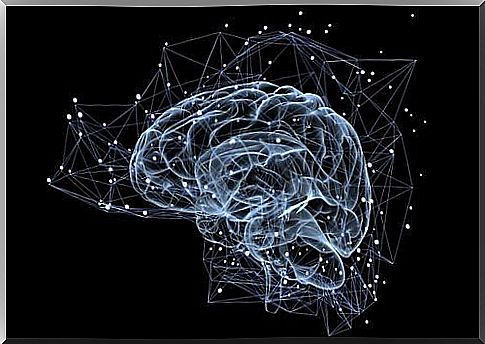Chronic Anxiety And Norepinephrine: What This Connection Means

You start the day by saying that it will not affect you today. Today will be a good day. But still it happens. Because when you suffer from chronic anxiety, the fear is always there. It’s waiting to grab you, and when it does, you’re lost. Anxiety and norepinephrine are interconnected, and it is a relationship worth learning more about.
Anxiety makes you lose your breath, shake, cold sweats and gives you catastrophic ideas. All of these processes are controlled by the molecule we mentioned above: norepinephrine.
For those who have not heard of this neurotransmitter – which in turn acts as a hormone – we will start with a short example. Imagine you are crossing the street. Suddenly you hear a car honking. You forgot to look at the traffic lights and had to react in a fraction of a second to jump out of the way.
You feel how fast your heart is pounding. You have a knot in your stomach and your breathing has increased dramatically.
Norepinephrine acts directly on the sympathetic nervous system. Noradrenaline is responsible for mediating in situations where our brain interprets that there is a danger. It is this neurotransmitter that helps us react, escape, fight or simply survive.
It does this by increasing our heart rate and blood pressure. In addition, it increases the amount of air that passes through the lungs and the contraction of the muscles. All these neurochemical and physiological actions allow us to respond much better to everyday tasks.
But the problem in our modern world is that most of us react to stressors that have nothing to do with real physical risks. Our psychological fears, clouds of anxiety and phobias activate this hormone in the same way.
Because of this , the effect of norepinephrine in the body will be devastating in someone who cannot manage their anxiety.

They say that chronic anxiety is like having a disease with 100 symptoms. The most interesting thing about all of this is that most people learn to live with their fears on a regular basis, despite these physical, emotional and cognitive symptoms.
What started as a common and manageable anxiety has become chronic. It has developed into a very serious condition.
The worst thing about anxiety is that it’s a big liar. It makes us believe that we are losing control. It says we should listen to our phobias because they are always right. And beyond that, it will convince us to worry about everything. Always expect the worst, it tells us.
As we can see, it is not easy to get out of this endless suffering. And this is mainly for the effect that cerebral biochemistry has on us. That is why the link between chronic anxiety and norepinephrine is so important.
New research from the University of Iowa has led to interesting findings. It has revealed the intimate link between norepinephrine and the risk of cardiovascular disease in people with chronic anxiety. Stress that persists over time results in very harmful physiological changes. Among these we find high blood pressure, tachycardia and arrhythmias. All of these processes put health at risk.

One thing we must remember is that norepinephrine is not only produced in the brain. Outside the brain, norepinephrine is also found in the endocrine system – more specifically in the adrenal glands. What does that mean? That chronic anxiety and norepinephrine are linked because the former increases the production of the latter.
Overproduction can lead to the following:
- Headache
- Digestive problems
- Insomnia
- Lack of appetite
- Fatigue
- Sweating
- Constant feeling of illness

There are many interesting studies that, for example, show the link between elevated levels of norepinephrine and ADHD. As a neurotransmitter, this ingredient is vital to help us focus our attention. It also helps us to remember data, learn and process information. However, the level must be correct for our cognitive processes to function effectively.
A level that is too high or low can cause memory loss, lack of attention and difficulty learning new things. It is an exhausting and complicated condition.
We already know that people with chronic anxiety have too much norepinephrine. But there is one fact we must not forget. It is known that catecholamines – such as norepinephrine and dopamine – are very important for the pathophysiology, or symptoms, of certain depressive disorders.
Any overproduction or deficiency can cause serious mood swings.
It is common for many patients, living in a circle of fear and negative thoughts created by anxiety, to suffer from deep depression.
Dr. Joseph J. Schildkraut of Harvard University speculated about this in the 1960s. He realized that it is norepinephrine, not serotonin, that causes us to suffer from chronic anxiety or depression.

The link between chronic anxiety and norepinephrine is good to know because it helps you tackle this disease properly.
We can choose between two situations: the first is to stay at the edge of the abyss and experience the same fear day by day. In this way, we will fall into the abyss on a daily basis. The second option is simple: we can choose to be a reactor. A reactor like an airplane flying over the same abyss. It observes it from above, understands it better, gets around it and leaves it behind.
Cognitive behavioral therapy can help us understand the root of our anxiety. Nor should we ignore the pharmacological method of balancing the production of norepinephrine. Also remember that a diet rich in vitamin C, copper and omega 3 fatty acids helps us maintain the right levels of this neurotransmitter.








